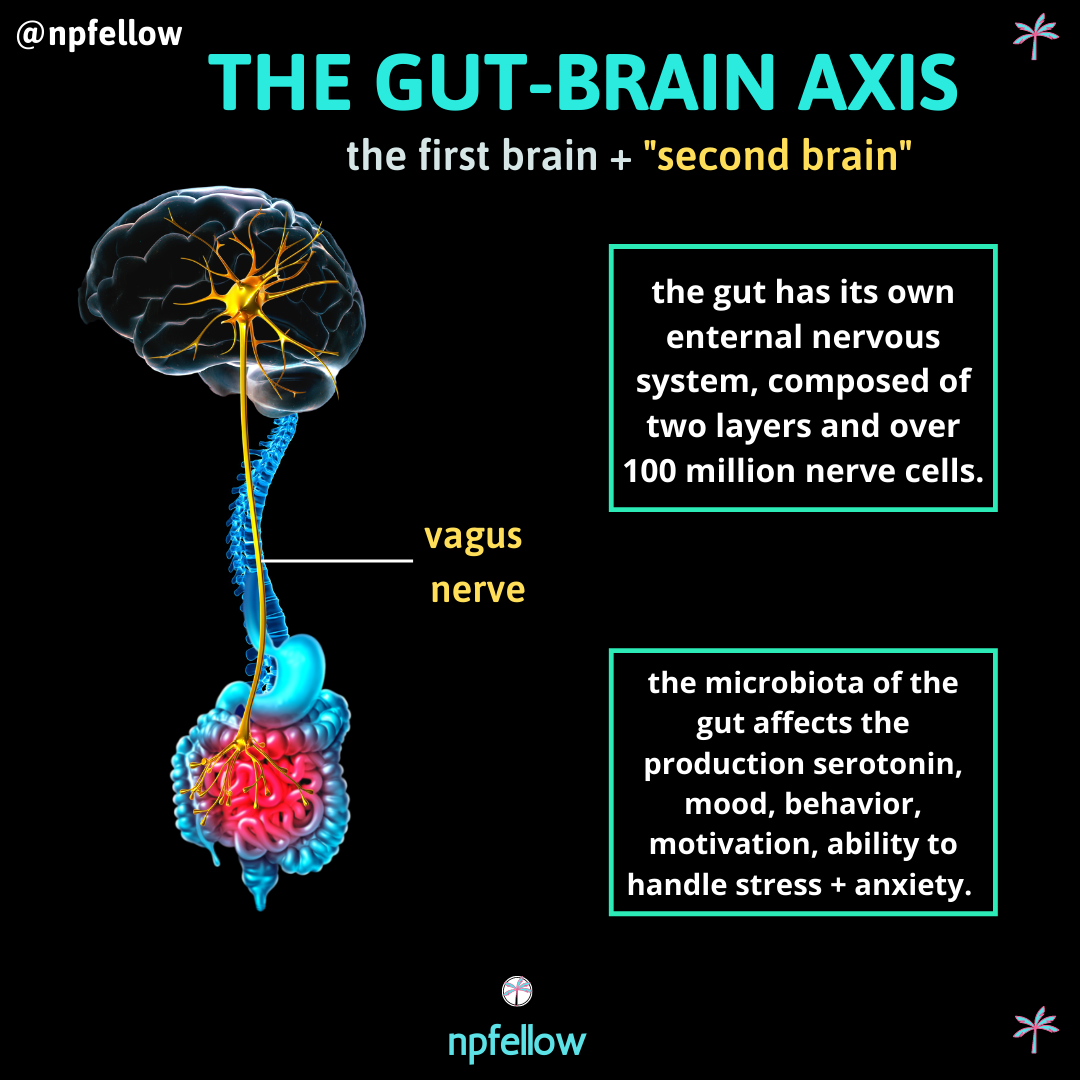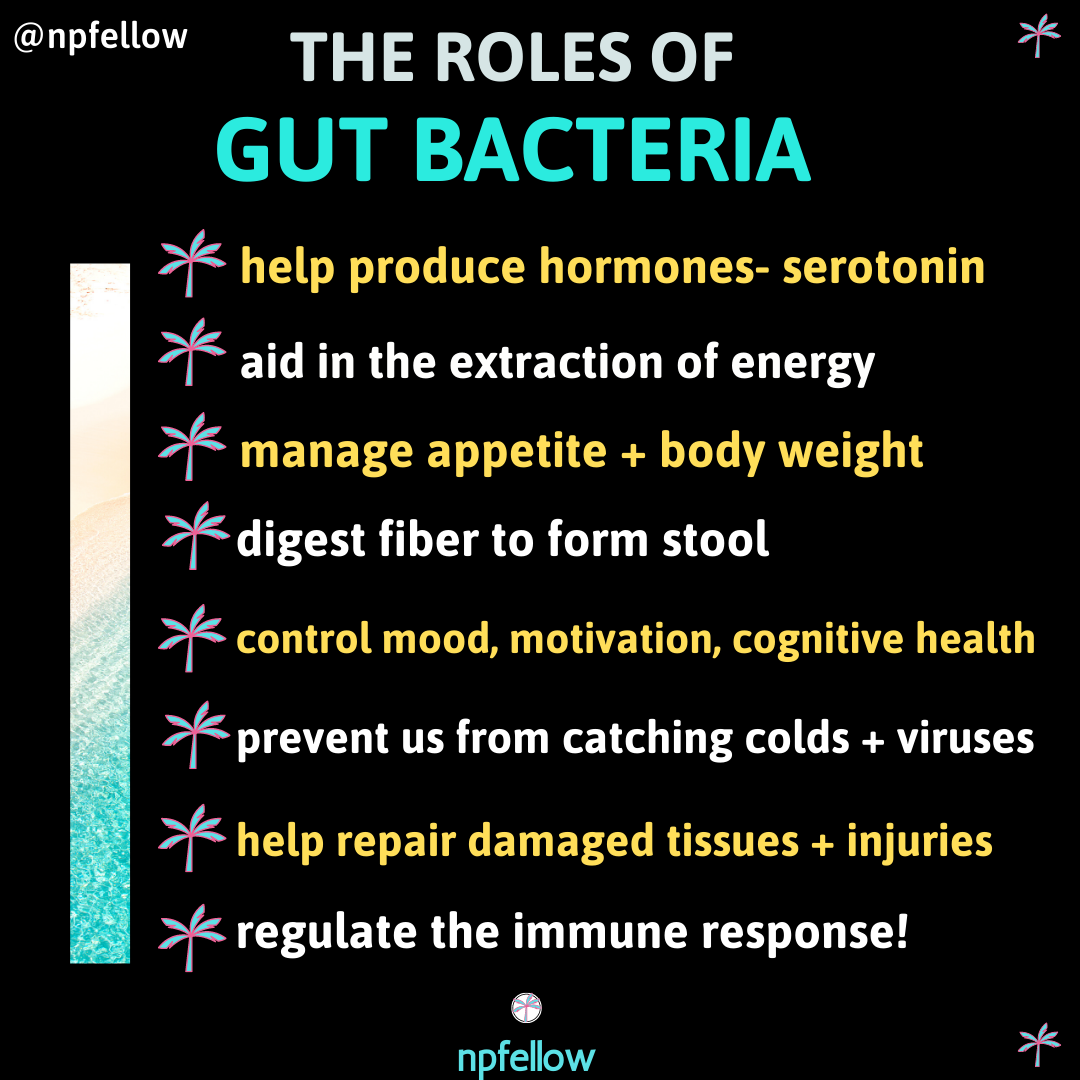The Gut-Brain Axis + The Gut Microbiome

The gut has its own “on-site brain.” The enteric nervous system (ENS) is composed of two thin layers and more than 100 million nerve cells. The gut is able to control digestion through its own brain instead of sending signals from the spinal cord to the brain. The gut-brain axis is a two-way communication network between the central nervous system (CNS) and ENS that links emotional and cognitive centers of the brain with peripheral (outside the brain + spinal cord) intestinal functions via the gut microbiota. This bidirectional communication network also includes the autonomic nervous system and the hypothalamus-pituitary axis. The gut mircobiota play a key role in the gut-brain axis and communicate via the vagus nerve. Dysbiosis (imbalance of the gut microbiome) can lead to mood disorders, depressive-like behaviors, irritable bowel syndrome, weight gain, inflammation, and poor response to stress. Thus, our gut microbiome has a major impact on how we feel and our moods. It is important to understand that recent research is showing that poor gut health is leading to mood disorders and mental issues, rather than poor mental health leading to gut issues.

The Gut Microbiome
There are trillions of microorganisms living in our gut that are good, beneficial bacteria. These bacteria have a strong working relationship and are constantly communicating with the neurons in our brain. The GI system has its own enteral nervous system; hence, why is it called the “second brain.” Gut bacteria are vital to our health, play numerous roles, and provide many benefits. Above our key roles of the bacteria in our gut, but those are definitely not all of them. One of the most important roles of good bacteria is regulate our immune system. They protect us against pathogen colonization and invasion of harmful microbes that enter the body every single day. Changes and imbalance of the microbiota is where things go wrong and poor gut health begins. This can lead to weight gain, obesity, hormonal imbalances, mental health disorders, autoimmune disorders, and chronic inflammation. Exercise, stress management, a gut-friendly diet, and consuming probiotics are some ways to start improving gut bacteria.

The Gut Microbiome + Prevention of Chronic Inflammation
The health of our gut is critical in the prevention of chronic low-grade inflammation. The gut microbiome is known as “the second brain,” and in Eastern medicine known as the “first brain.” The gut microbiome is our own bacterial ecosystem in gastrointestinal system. It is vital to our health. There are trillions of bacterial microbes in the gut that communicate with neurons in the brain. A balance of healthy and bad bacteria is essential to our immune response regulation. The problem arises when the good and bad bacteria become imbalanced. The bad bacteria begin to communicate with the neurons in our brain. Alternations in the microbiota, poor diet, and toxins disrupt the micobiome, which leads to local (gastrointestinal) inflammation, systemic inflammation, and mucosal lining and intestinal wall disruption. This increases gut permeability, which leads to leaky gut, obesity, chronic low-grade inflammation, disease, and cancer. Most disease begins in the gut and it is very important to understand this concept and how to maintain an overall healthy gut.

Boost The Gut-Brain Connection
The gut brain connection is a bidirectional communication network. Both the central nervous system and gastrointestinal system has its own set of neurological pathways and neurons. Both the brain and the gut are constantly communicating with each other. This causes us to have butterflies when we are nervous or intestinal pain when we are stressed. The connection also demonstrates how poor gut health health or an imbalanced gut microbiome can lead to mood disorders; such as, anxiety and depression. It is very important that we maintain optimal gut health for a healthy, fulfilling life. A mindful diet, exercise and proper stress management are crucial for stabilizing gut bacteria and keeping inflammation levels down.
Thank you for reading this post.
